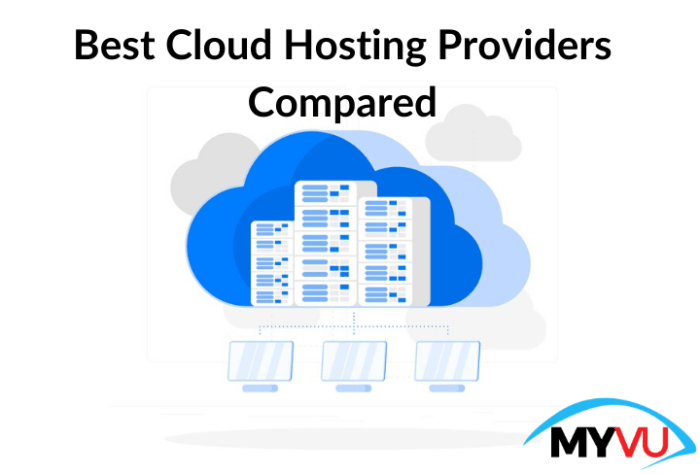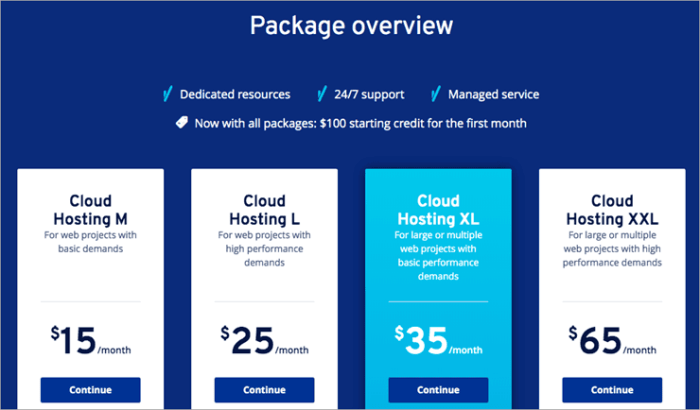Best Cloud Hosting Providers: Pros, Cons, and Pricing takes center stage as we delve into the world of cloud hosting, exploring its benefits and challenges. This guide provides a comprehensive overview of the top cloud hosting providers, their key features, pricing plans, and how to choose the right provider for your needs. Whether you’re a small business owner, a large corporation, or an individual looking to build a website, understanding the intricacies of cloud hosting is essential for success in today’s digital landscape.
Cloud hosting has revolutionized the way we manage and access data, offering a flexible and scalable solution for businesses of all sizes. From increased security and reliability to cost-effectiveness and enhanced performance, cloud hosting presents a compelling alternative to traditional hosting methods. But with so many providers vying for your attention, navigating the cloud hosting landscape can feel overwhelming.
This guide aims to demystify the process, providing you with the information you need to make an informed decision.
Introduction

Cloud hosting is a method of storing and accessing data and applications over the internet, rather than directly on a physical server. Instead of owning and maintaining your own servers, you rent computing resources from a third-party provider, who manages the infrastructure and ensures its availability.Cloud hosting offers numerous advantages over traditional hosting methods, making it a popular choice for businesses and individuals alike.
It provides flexibility, scalability, cost-effectiveness, and enhanced security.
Key Factors to Consider When Choosing a Cloud Hosting Provider
Choosing the right cloud hosting provider is crucial for your website or application’s performance, reliability, and security. Here are some key factors to consider:
- Pricing and Plans: Cloud hosting providers offer various pricing plans based on your needs. It’s important to compare the features, storage space, bandwidth, and other resources offered by different providers to find the best value for your money.
- Performance and Reliability: The provider’s infrastructure, server location, and network capacity play a significant role in website performance and uptime. Choose a provider with a proven track record of reliable service and fast loading times.
- Security and Data Protection: Data security is paramount in the cloud. Ensure the provider has robust security measures in place, such as firewalls, intrusion detection systems, and regular security audits. They should also offer data backup and recovery options.
- Scalability and Flexibility: Cloud hosting offers the ability to scale your resources up or down as needed, allowing you to adapt to changing traffic demands. Choose a provider that provides flexible scaling options to meet your future growth requirements.
- Customer Support: Look for a provider with responsive and knowledgeable customer support. Consider factors like availability, response times, and the availability of various support channels, such as phone, email, and live chat.
Top Cloud Hosting Providers
Now that we’ve covered the basics of cloud hosting, let’s delve into some of the top providers in the market. Each provider offers a unique set of features, pricing plans, and target audiences. We’ll explore their strengths and weaknesses, along with their pricing structures, to help you make an informed decision.
Top Cloud Hosting Providers
Choosing the right cloud hosting provider can be a daunting task, as many reputable options are available. Here’s a breakdown of five leading providers, highlighting their pros, cons, and pricing plans:
| Provider | Pros | Cons | Pricing |
|---|---|---|---|
| Amazon Web Services (AWS) |
|
|
Starts at $0.01 per hour for EC2 instances, with various pricing models for different services. |
| Microsoft Azure |
|
|
Starts at $0.01 per hour for virtual machines, with various pricing plans for different services. |
| Google Cloud Platform (GCP) |
|
|
Starts at $0.01 per hour for virtual machines, with various pricing plans for different services. |
| DigitalOcean |
|
|
Starts at $5 per month for basic cloud servers, with various pricing plans for different server configurations. |
| Linode |
|
|
Starts at $5 per month for basic cloud servers, with various pricing plans for different server configurations. |
Cloud Hosting Features: Best Cloud Hosting Providers: Pros, Cons, And Pricing

Cloud hosting provides numerous features that make it an attractive option for businesses and individuals alike. These features cater to a wide range of needs, offering scalability, security, performance, and more.
Scalability
Scalability is a crucial aspect of cloud hosting, allowing users to adjust their resources based on their needs. Unlike traditional hosting, where resources are fixed, cloud hosting offers the flexibility to scale up or down as required. This dynamic allocation ensures optimal performance and cost-effectiveness.
- On-demand resource allocation: Cloud hosting allows users to add or remove resources like CPU, RAM, and storage as needed. This dynamic allocation ensures that resources are available when needed, preventing performance bottlenecks.
- Automatic scaling: Some cloud hosting providers offer automatic scaling features. These features monitor resource usage and automatically adjust resources based on pre-defined thresholds, ensuring optimal performance even during traffic spikes.
- Pay-as-you-go pricing: Cloud hosting typically operates on a pay-as-you-go model, where users only pay for the resources they use. This flexible pricing model eliminates the need for upfront investments and allows for cost optimization.
Security
Security is paramount in the digital world, and cloud hosting providers offer robust security measures to protect user data and applications. These measures ensure the safety and integrity of sensitive information.
- Data encryption: Most cloud hosting providers encrypt data both at rest and in transit, using industry-standard encryption algorithms like AES-256. This encryption safeguards data from unauthorized access, even in the event of a data breach.
- Firewalls and intrusion detection systems (IDS): Cloud hosting providers typically implement firewalls and IDS to protect their infrastructure from malicious attacks. These security measures prevent unauthorized access and detect suspicious activity.
- Regular security updates: Cloud hosting providers regularly update their infrastructure and software to patch vulnerabilities and enhance security. This proactive approach ensures that the hosting environment remains secure and protected.
Performance
Performance is crucial for any website or application. Cloud hosting provides several features that enhance performance, ensuring fast loading times and smooth user experiences.
- High-performance infrastructure: Cloud hosting providers invest in high-performance hardware and software to ensure optimal performance. This infrastructure includes powerful servers, high-speed networks, and optimized software configurations.
- Content Delivery Networks (CDNs): Many cloud hosting providers offer CDN services, which distribute content across multiple servers globally. This distribution reduces latency and improves website loading times for users worldwide.
- Load balancing: Cloud hosting providers use load balancing techniques to distribute traffic across multiple servers. This distribution prevents server overload and ensures consistent performance, even during peak traffic periods.
Support
Reliable customer support is essential for any hosting provider. Cloud hosting providers offer various support channels to assist users with technical issues and address their concerns.
- 24/7 technical support: Most cloud hosting providers offer 24/7 technical support via phone, email, or live chat. This ensures that users can get help whenever they need it, regardless of the time zone.
- Knowledge base and documentation: Many cloud hosting providers offer comprehensive knowledge bases and documentation to help users troubleshoot issues independently. These resources provide detailed information on various topics, including setup, configuration, and troubleshooting.
- Community forums: Some cloud hosting providers have active community forums where users can connect with other users and share experiences, ask questions, and find solutions to common problems.
Backup and Recovery, Best Cloud Hosting Providers: Pros, Cons, and Pricing
Data loss can be catastrophic for businesses and individuals. Cloud hosting providers offer backup and recovery features to protect user data and ensure business continuity.
- Regular backups: Cloud hosting providers typically perform regular backups of user data, ensuring that data is protected against accidental deletion or hardware failures.
- Data recovery options: Cloud hosting providers offer various data recovery options, allowing users to restore data to a previous point in time or retrieve lost files. These options ensure business continuity and minimize downtime in case of data loss.
- Disaster recovery: Some cloud hosting providers offer disaster recovery services, which ensure that data and applications can be restored to a secondary location in case of a major disaster. This service provides an extra layer of protection and ensures business continuity in the face of unforeseen events.
Choosing the Right Cloud Hosting Provider
Selecting the right cloud hosting provider is crucial for ensuring your website’s performance, security, and scalability. A well-chosen provider can significantly impact your website’s success, while a poor choice can lead to downtime, security breaches, and even financial losses.
Factors to Consider When Choosing a Cloud Hosting Provider
Before you begin comparing providers, it’s essential to understand your specific needs and requirements. This will help you narrow down your options and make a more informed decision. Here’s a checklist of factors to consider:
- Website Traffic Volume: The amount of traffic your website receives directly impacts the resources you need. A high-traffic website requires more processing power, bandwidth, and storage than a low-traffic site. Understanding your traffic volume will help you choose a plan with adequate resources to handle the load.
- Budget: Cloud hosting providers offer a wide range of pricing plans, from basic shared hosting to enterprise-level solutions. Determine your budget and prioritize features based on your financial constraints. Remember, cheap plans might offer limited resources and support, while more expensive plans may provide greater flexibility and scalability.
- Technical Expertise: Consider your technical knowledge and the level of support you require. Some providers offer managed hosting services that handle all technical aspects, while others require more technical expertise for configuration and maintenance. Choose a provider that aligns with your technical skills and comfort level.
- Specific Needs: Different websites have unique requirements. For example, e-commerce websites need secure payment gateways and robust security features, while content management systems (CMS) require specific database configurations and integrations. Identify your specific needs and choose a provider that offers the necessary features and support.
Cloud Hosting Use Cases

Cloud hosting has become ubiquitous across various industries, empowering businesses and organizations to achieve scalability, flexibility, and cost-effectiveness. Cloud hosting offers a robust and adaptable platform for a wide range of applications and use cases, from small startups to large enterprises.
E-commerce
E-commerce businesses rely heavily on reliable and scalable hosting solutions to handle fluctuating traffic volumes and ensure smooth online transactions. Cloud hosting provides the necessary infrastructure to accommodate peak demands during promotional periods, sales events, and holiday seasons.
- Scalability: Cloud hosting allows businesses to easily scale their resources up or down based on real-time traffic fluctuations, ensuring optimal performance and preventing downtime during peak shopping hours.
- Security: Cloud providers offer advanced security features, including firewalls, intrusion detection systems, and data encryption, protecting sensitive customer data and financial transactions.
- Global Reach: Cloud hosting enables businesses to reach a wider audience by providing geographically distributed servers, ensuring fast loading times and improved customer experience across different regions.
Content Management Systems (CMS)
Cloud hosting is an ideal platform for hosting websites powered by content management systems (CMS) like WordPress, Drupal, and Joomla. Cloud hosting provides the necessary resources and flexibility to manage complex websites with dynamic content, large media libraries, and high traffic volumes.
- Performance: Cloud hosting offers high-performance servers and optimized infrastructure, ensuring fast page load times and improved user experience for visitors.
- Updates and Maintenance: Cloud providers handle updates and maintenance tasks, ensuring the CMS platform is secure and up-to-date, freeing up website administrators to focus on content creation and management.
- Collaboration: Cloud hosting facilitates seamless collaboration among team members, allowing multiple users to access and manage the CMS platform remotely.
Software as a Service (SaaS)
Cloud hosting is essential for Software as a Service (SaaS) providers, enabling them to deliver their applications to users over the internet. Cloud hosting provides the scalability, security, and reliability required for SaaS applications to operate efficiently and deliver a consistent user experience.
- Scalability: Cloud hosting allows SaaS providers to easily scale their resources based on the number of users and application usage, ensuring smooth operation and preventing performance issues.
- Security: Cloud providers offer robust security measures, including data encryption, access controls, and regular security audits, protecting sensitive user data and ensuring compliance with industry regulations.
- Global Availability: Cloud hosting enables SaaS providers to offer their applications to users worldwide, providing global reach and accessibility.
Big Data and Analytics
Cloud hosting plays a crucial role in big data and analytics initiatives, providing the necessary infrastructure to store, process, and analyze massive datasets. Cloud hosting offers scalable storage solutions, powerful computing resources, and advanced analytics tools, enabling organizations to extract valuable insights from their data.
- Scalability: Cloud hosting provides the ability to scale storage and computing resources on demand, accommodating the ever-growing volumes of data generated by modern businesses.
- Cost-Effectiveness: Cloud hosting eliminates the need for expensive on-premises infrastructure, offering a cost-effective solution for storing and processing large datasets.
- Analytics Tools: Cloud providers offer a range of analytics tools and services, enabling organizations to analyze data, identify trends, and make data-driven decisions.
Gaming
Cloud hosting has revolutionized the gaming industry, enabling developers to deliver immersive and scalable gaming experiences. Cloud hosting provides the necessary resources to handle high-traffic volumes, complex game logic, and real-time interactions between players.
- Scalability: Cloud hosting allows game developers to scale their servers based on player demand, ensuring smooth gameplay and preventing lag during peak hours.
- Performance: Cloud hosting offers high-performance servers and optimized infrastructure, ensuring low latency and a seamless gaming experience for players.
- Global Reach: Cloud hosting enables game developers to reach a wider audience by providing geographically distributed servers, reducing latency and improving gameplay for players worldwide.
Future Trends in Cloud Hosting
The cloud hosting landscape is constantly evolving, driven by technological advancements and changing user demands. Emerging trends are shaping the future of cloud hosting, offering new possibilities for businesses and organizations.
Serverless Computing
Serverless computing is a cloud-based execution model where the cloud provider manages the underlying infrastructure, including servers, operating systems, and scaling. Developers can focus on writing and deploying code without worrying about server management. This approach offers several advantages, including:
- Reduced Operational Costs: Businesses pay only for the resources used, eliminating the need for idle servers and reducing infrastructure costs.
- Increased Scalability: Serverless platforms automatically scale resources based on demand, ensuring optimal performance during peak traffic periods.
- Faster Development Cycles: Developers can focus on code development and deployment, as server management is handled by the cloud provider.
Serverless computing is becoming increasingly popular for applications requiring high scalability, short-lived workloads, and cost-effective solutions. Examples include event-driven applications, microservices, and API endpoints.
Edge Computing
Edge computing brings computation and data storage closer to users, reducing latency and improving responsiveness. This approach is particularly beneficial for applications that require low latency, such as real-time data analysis, streaming services, and gaming.
- Reduced Latency: Processing data closer to users minimizes network delays, improving application performance and user experience.
- Improved Data Security: Storing data at the edge reduces the need to transfer sensitive information to centralized data centers, enhancing security.
- Enhanced Scalability: Edge computing can distribute workloads across multiple edge locations, enabling faster response times and increased scalability.
Edge computing is expected to play a significant role in industries such as healthcare, manufacturing, and transportation, where real-time data processing and low latency are critical.
Artificial Intelligence (AI) and Machine Learning (ML)
AI and ML are transforming the cloud hosting industry, enabling intelligent automation, predictive analytics, and personalized experiences. Cloud providers are integrating AI and ML capabilities into their platforms, offering services such as:
- Automated Infrastructure Management: AI-powered tools can optimize resource allocation, predict server failures, and automate infrastructure management tasks.
- Predictive Analytics: ML algorithms can analyze data patterns to predict future trends, enabling businesses to make informed decisions and optimize operations.
- Personalized Customer Experiences: AI-powered chatbots and recommendation engines can provide personalized experiences, improving customer satisfaction and loyalty.
AI and ML are enabling cloud providers to offer more sophisticated and intelligent services, enhancing the efficiency and effectiveness of cloud hosting solutions.
In conclusion, choosing the right cloud hosting provider is a critical decision that can significantly impact your website’s performance, security, and overall success. By carefully considering your needs, budget, and technical expertise, you can select a provider that aligns with your goals and helps you achieve your online aspirations. As the cloud hosting landscape continues to evolve, staying informed about emerging trends and technologies is essential for maximizing the benefits of this transformative technology.
FAQ Compilation
What are the main types of cloud hosting?
There are several types of cloud hosting, including Infrastructure as a Service (IaaS), Platform as a Service (PaaS), and Software as a Service (SaaS). IaaS provides you with the basic building blocks of computing, such as servers, storage, and networking. PaaS offers a platform for developing and deploying applications, while SaaS provides ready-to-use software applications.
How do I choose the right cloud hosting provider?
Choosing the right provider depends on your specific needs, such as website traffic volume, budget, technical expertise, and desired features. It’s essential to consider factors like scalability, security, performance, support, and pricing plans.
Is cloud hosting secure?
Cloud hosting can be highly secure, but it’s important to choose a provider with robust security measures, such as data encryption, firewalls, and intrusion detection systems. You should also implement your own security practices, such as strong passwords and regular security updates.
How do I migrate my website to the cloud?
Migrating your website to the cloud involves transferring your website files and database to a cloud hosting provider. Most providers offer tools and support to facilitate this process. It’s essential to plan the migration carefully and ensure that all data is transferred correctly.